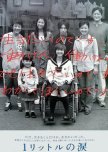
This review may contain spoilers
"A person is born between two people. It's impossible to live alone"
Umi no Hajimari is a drama that asks only one thing from its audience: to pay attention to the struggles of its characters.Those who are young, inexperienced, or simply haven’t developed a strong sense of empathy yet for fictional characters might look at this drama as being black and white. Meaning, they’ll perceive there being good characters and bad characters, but nothing in between. However, those of us who prefer characters and situations that mirror real life will likely have an easier time watching and understanding the complex motivations of each character.
I’ve been following this drama from week to week and noticed the different themes throughout this beautiful story so I'd thought I'd share some of them.
You Can't Do it Alone
Every flashback scene with Mizuki raising Umi highlights the struggles single parents go through. But through all the struggle, all the hardships, there's one key thing that stood out amongst these scenes: Mistsuki wasn't alone. She had a support system. Yes, she was emotionally distant with them, but still had people to lean on.
Flawed Characters Faced With Big Decisions
Mizuki’s Flaw - Fiercely independent, made decisions on the fly without talking to other people, was willing to struggle alone as opposed to asking for help.
Natsu’s Flaw - Indecisive, a follower, doesn’t express his own thoughts and feelings well.
Yayoi’s Flaw - Too agreeable, feels she is not important, doesn’t consider her own thoughts and feelings.
Each of these flawed characters were forced to make tough choices. For Mitsuki, she was torn between telling Natsu about his child or allow him to continue to live his life. For Natsu, his choice was to step up and be a father for Umi or continue to figure out what is the right thing to do. Lastly, Yayoi was confronted with a decision on whether or not she should play an active role in Natsu and Umi’s lives or leave them entirely.
These thoughts and choices all shape how this drama unfolds. Seeing such flawed yet relatable characters navigate around life’s hardest choices adds a realistic element to the story. As an adult and avid drama watcher, these types of portrayals is invaluable. For younger viewers, this should show you that not everything in life is black and white. Every story doesn’t have a hero and villain, but rather regular flawed people trying their best to make ends meet.
Grief - “Everyone’s so nice but suffering too”
Grief plays an integral role throughout this drama.
It weaves itself in and out of almost every dialogue. At times It’s subtle and poignant. Inescapable. Then there are moments where the grief becomes loud and present - demanding your attention. Urging you to understand the great loss the characters are going through.
For Mizuki's parents, the grief was almost unbearable to see play out. It caused them to unfairly criticize Natsu and even invoked anger towards him (At least on the moms part). Even Natsu himself wasn't immune to the effects of grief.
In Episode 8, Natsu has a conversation with his estranged dad. Actually, it was more like a venting session where Natsu spills out things that he bottled up inside, but that’s besides the point. Natsu said something along the lines of everyone is so nice but suffering too. He then mentioned, like he did before, how he feels like it’s not his right to feel sad because everyone was with her for seven years and he wasn’t. He then said that doesn’t change the fact that he’s sad as well.
Natsu was doing the common thing most grieving people do: quantifying sadness. Quantifying sadness, in simplest terms, is when you place an undetermined numerical value or weight to sadness when comparing it with others. It’s like saying he’s competing in the “Pain Olympics” with everyone who were closer to Mizuki than he was.
Grief doesn’t care about the duration of knowing someone. On the surface, it seemed like Natsu was catching up with everyone's grief, but in reality, he was in pain just like those closest to her. There are no levels of grief. Grief just is.
There are more themes but I didn't want to drag this review on longer lol. Overall, Umi no Hajimari will most certainly have a special place in my heart.
Was this review helpful to you?

Amazing in all aspects
This drama is all-around amazing. The approach this show takes on topics like family, friends, love, parenthood are incredibly deep and promote great viewer reflection. Each of these topics are covered from several perspectives and the viewpoints are all so nuanced. Ren Meguro's acting is unimaginably realistic, especially near the climax of the show starting from ep 10. His gaze literally transfers his feelings as a struggling father through the screen. (This was even after he fell ill in the middle of the filming schedule) Every second of the show is packed with the efforts of the cast and the crew and the show is totally worth rewatching multiple times. The plot is so intricate, the sets are detailed, the acting is dynamic, and the music is matches perfectly. Couldn't recommend this show enough.Was this review helpful to you?

Get ready for an emotional journey
"Umi no Hajimari" is an extraordinary drama that captivates with its depth, emotional charge and thoughtful narrative. The drama deftly tackles important themes of love, parenting and family relationships, offering a range of perspectives that show the complexity of these experiences. The excellent acting adds authenticity to the characters and their struggles. Each character has their own unique emotional turmoil, and their development is shown in an authentic and moving way.Rena Meguro's acting is unbelievably realistic. His ability to convey the inner emotions of a father struggling to find balance in difficult situations brings his feelings through the screen.
Additionally, visual aspects, such as the picturesque landscapes of Japan, support the narrative, giving it an additional dimension. The shots by the sea are not only aesthetic, but also symbolic, emphasizing the emotional charge of the story.
In short, "Umi no Hajimari" is an emotional journey that shows the beauty of life, in its simplest and most difficult moments. I wholeheartedly recommend it to any drama lover who appreciates emotional depth and artistic quality.
Was this review helpful to you?
Umi no Hajimari: An Emotional Journey Through Parenthood and Love
“Umi no Hajimari” is a drama that stands out for its emotional depth and ability to approach complex themes such as family, love, and fatherhood in a nuanced manner. The narrative unfolds from multiple perspectives, allowing viewers to reflect on their own experiences and relationships. This ability to touch on universal issues gives each scene significant weight, creating an impact that resonates far beyond the screen.Ren Meguro’s acting is one of the series’ greatest highlights. He delivers an impressive performance, capturing the inner struggle of a father trying to balance his responsibilities with his desires. Despite facing difficulties during filming, his ability to convey authentic emotions shines through, especially in climactic moments, where his character’s evolution becomes palpable and realistic. The audience is made to feel every nuance of his journey, making his emotional experiences resonate deeply.
Japan’s picturesque settings also play a key role in the drama’s atmosphere. The stunning seaside landscapes not only embellish the narrative, but also symbolize the characters’ emotional ups and downs. This combination of natural beauty and the emotional depth of the story creates a rich visual experience, intensifying the viewer’s lore and almost shifting the setting into a separate character.
The drama’s intricate narrative intertwines the lives of multiple characters, each with their own emotional struggles. This authentic development allows viewers to connect and empathize with their stories, reflecting the reality of human interactions, often filled with love, conflict, and growth. This complexity makes “Umi no Hajimari” accessible and moving, resonating with a wide range of personal experiences.
Finally, the immersive soundtrack perfectly complements the narrative. The carefully chosen tracks elevate key moments in the plot, contributing to the emotional atmosphere and keeping the viewer engaged. The harmony between sound and image is one of the reasons why the drama leaves such a strong impression, making it perfect and worthy of revisiting.
All in all, “Umi no Hajimari” is an emotional journey that sensitively addresses the complexities of parenthood and family bonds. The series not only entertains, but also provokes deep reflections on love, resilience and the beauty of life's imperfections, making it a must-watch for drama lovers seeking meaningful and authentic content.
Was this review helpful to you?

This review may contain spoilers
from very sad to very happy and eveything inbetween
After Mizukis death everyone is struggling to come to grips with reality. Her parents are devasted, her not be boyfriend is and of course her daughter Umi is. For Natsu her ex, his world changes daramatically after he learns he has a daughter and his struggles just begin. His GF also struggles with a decision she felt she should not have made, but she is also the reason Umi exists, even when both of them never knew each other. While the do not force each other to be a "happy" family they bond through Umi in another way.This show is an exceptional series depicting the feelings of all persons involved. I would call it a tear-dropper. We get everything from the happy moments to the sadest moments and everything inbetween. The only thing we don't get is a conventional happy familiy, which is not a bad choice at all. In the end all of them support each other having bonded through Umi which is a very happy end indeed.
I can only recommand this show. If you are sensitive you may watch this kind of drama with friends and/or family because it could wear you down. The only thing I don't understand is, why Umi-chan is not a main lead because acting in such heavy stuff must be vey challenging for a seven year old girl. Besides her the cast was exceptional, the cinematography top notch and everything was executed to perfection.
Was this review helpful to you?

Makes You Remember: Family Above All!
Where to begin with?The entire drama has been nothing short of an emotional flood of remembrance, love, and pain. The show made me cry from the very beginning till the end and made me realise in every aspect how much your loved ones can mean to you. It's not just about how the story progressed but the flashbacks in between, the small anecdotes, the memories and the ever-daunting pain of losing a loved one and yet moving on with life is what this drama is all about.
If you are someone who wants to take some time off from the typical Rom-Coms then this drama is definitely for you. While the show could have focused more on the newly found father-daughter relationship, it still summarised their love in the best way possible! The drama is worth your time!
Was this review helpful to you?
This review may contain spoilers
“ either choice you make, make the choice that will make you happy”
This drama was so beautifully made, with a lot of details and talks about difficult and sensitive themes as death, grief but also life and what is a family, and have several messages that I loved but some may not agree with. And it’s normal as everyone has their own “right” and “wrong” but this drama shows everyone, every characters point of view and emotions and feelings going through a difficult moment of their life.
It’s very realistic, the visuals are stunning, the music is beautiful and really fits well to this drama. This drama is not only sad and painful but also warm and has a little light of hope like a little light from the sunset.
I definitely recommend it and I think that I even recommend to re-watch it from ep 1 when you completed it, because I think that way we could understand more some characters and would be like « oh that line, that’s why that person was like that, oh that person must have felt like that at that time » etc and see a little bit differently ☺️
“Mom, Where the sea begins? “
Vague answer: “Where there is water. “
“The beginning is vague and probably there is not an ending”
“ Natsu that wasn’t there, became a dad one random day, and me that isn’t there anymore, is still Umi’s mom “
“Just be there for her, so that someday she will be happy that you were there”
This letter tells it all🥹✨
I also want to share the messages in this drama that’s been conveyed that I liked 🥹Bellow there are major spoilers!
1. First of all in Japan and I think in many other countries, have the opportunity to have check ups of several diseases for free or almost, however many, myself included, won’t go for several personal reasons. And this show really put people like me realise that’s just dumb and we don’t know what could happen. So liked that message.
2. The words “Choices” and “decisions” were used a lot since ep 1.
This drama showed us that humans all makes choices and that there isn’t a bad/wrong or good/right choice in the end , you are the one to decide that and feel that.
Like Yayoi’s decision she said she didn’t regret doing it (even if at that time she didn’t want to) because now she have something more and is happy (ep 3 or 4 If recall 🤔) And even her decision in the end of the drama , the last episode really showed us that she was finally happy (that scene when she made corokke and then eats it )she said in another ep that corokke was very difficult to make and that if someone made it for her, that means that she is very loved by that person so that scene= her giving herself love and I loved that message because it is linked to again another message of living YOUR life, making YOUR decisions and not always thinking about others and putting others before yourself and finally put your own happiness first.
3. « I’m here » is a key word in this drama that was used from ep 1 to the last.
It meant « family »
Natsu wasn’t « here » for umi for seven years but was existing (iru =existing, being here) because Mizuki kept him alive by talking about him to umi (that’s why She choose to live with him and loves him)
Many didn’t in my opinion understand the meaning of ep 11 but that actually was that message. Natsu kept avoiding talking about Mizuki so it felt like erasing her from Umi. If he talks about her, she is being alive inside of their hearts. (Ita = she was there, so she still exist in her heart)
Natsu’s father wasn’t there for him (inakatta) ( both physically and emotionally until the middle of the drama) her mom didn’t talked about him that’s why Natsu didn’t want to do any with him until he became a dad himself and wanted to confront him.
that showed how just being there physically and not being there physically but being there emotionally is also a different way of defining what is a family.
4. Family is not only blood
Tsuno was there with Umi during those 7 years , so he was basically a father to her even now so he is her family for her.
Yayoi is still here for umi even after all that happened.
Mizuki, Natsu, Yayoi, grandpa, grandma, Tsuno kun, grandpa grandma 2, big brother and natsumi sensei.
→In the end Umi’s got a big big family that loves her🥹 that is related or not by blood and that’s what makes this drama so beautiful✨
4. The message of parenting of «giving the right to your child to make their own choices and decisions= loving him/her »
I realised I didn’t and still don’t have that so that touched me but also learned a lot. I also liked that scene when umi asked if Natsu would be here « forever » and I hate the way adults always lie to children and treat them like children, when in reality even children can tell what adults are feeling just by seeing their expressions. So I really loved that Natsu didn’t lied to her.
5. The “don’t judge by apparences”message
Like yayoi lines says in the last episode of “ don’t jump to conclusion that I am not enjoying myself or that I am bored” “ don’t conclude that I’m sad/ lonely”
You can’t know what someone’s thinking and feeling.
natsu’s feelings aren’t very shown with words here, because he is that kind of person that keeps all in, because he cares about everyone.
But his emotions are shown beautifully just from his expressions. He is sad, he is in pain.
And the same for Mizuki’s mother, she sounds harsh but she is just grieving in her own way and was lonely because she was still seeing her daughter in Umi.
We could never imagine what it feels like to lost your child if we don’t experience it ourselves 😢 I loved that scene saying to Natsu “Imagine your daughter dying before you” and then Mizuki saying “Imagining dying before my daughter, compared to that, I’m okay with it(dying before), so… I’m sorry mom” 😭😭 she must felt what her mom is feeling…😭 that was just heartbreaking 💔
(In another note the mother is definitely loving Natsu as her own son🥹I loved those scenes of mom-son fights they were so cute )
Talking about grief I also liked the message about “You don’t have to forget about them, and you don’t have to not talk about them”
A lot of people won’t agree with Mizuki’s decisions and would find her selfish and I understand. however I think( and It was very clear for me…) that all the decisions she’s made was because she loved Natsu and Umi and then even Tsuno 🥲
“Natsu you too be with someone and be yourself happy while making umi happy”
this drama has an ending but the story still continues as the message of there isn’t an ending like the sea🥹🌊
I personally imagine that they would be all raising together umi and about yayoi how knows ☺️she may be her “legal” mom one day~ but even if she doesn’t I’m sure she will be her second mom in Umi’s heart~🥹✨(like yamato~)
Was this review helpful to you?
This review may contain spoilers
Ambitious in its intent but fell flat in the writing
To be honestly, when I first saw this drama I had high hopes because I really like deep slice of life and the premise sounds intriguing too. When I saw that the drama was made by the same person who did Silent, I realised I had to lower my expectations because I didn’t really enjoy the latter. First episode was not great as it was unnecessarily slow and draggy, a problem that plagued Silent. It picks up afterward when it goes deep into issues like death, grieve, abortion, parenting responsibilities. But the series just went absolute downhill after the episode where Natsu met his father. Every episode seems like it’s about how much they can make Natsu suffer when he is the most patient and kind character I’ve seen. Realistically, if I were in his shoe, I would have flip.While the intention of the drama is admirable because it really tries hard to go into the aforementioned issues, its writing did not deliver. The biggest problem is Mizuki as a character. The entire series revolve around her and how because she died, her words become a life manual to everyone on how they should live. She is written as someone who believes in having options to live your life, but her words are dictating and influencing how everyone should live. And that’s problematic, because while her option to keep her child and not tell Natsu is celebrated as pro choice, it also portrays her as selfish because she is thinking about what makes her happy for her or what is right for her but without thinking the impact on others. To me, being pro-choice is a good thing, but it’s not a one-sided thing that it’s always good as there is the selfish element that the drama did not address. So, I feel that there is a propagandistic narrative (being pushy about this concept of pro choice) that the drama is trying to convey without the needed nuance to the conversation.
In the end when the writer tries to salvage Mizuki’s selfish actions by showing her letter to Natsu just isn’t convincing to me because her actions are clearly selfish but they make it sounds like she has Natsu’s intention at heart. No, she is imposing what she hopes Natsu would be and not actually giving him much choices which she claims she is. To me, her character is written as a master gaslighter especially to viewers.
Besides the flawed writing, everyone’s performance were great. Ren’s acting have surely improved but he still needs help in emotional scenes, a similar problem I had when he acted in Silent. I wasn’t convinced of his breakup scene because it felt forced. But I heard from social media that he really had trouble getting into the emotions for this and felt bad for him. I guess it’s still good that he is aware and can’t wait for his next show which hopefully, he would be better. Music is the best element in the show, love the melancholic soundtrack and also the back number song is a bop, which I don’t usually say it in my reviews.
Was this review helpful to you?

This review may contain spoilers
Unexpected and definitely controversial
Good drama but sad. Series revolves around a man who discovers that he is a father after the loss of the child’s mother. It is somewhat realistic in the sense of the effort that individuals have to go through to connect with people that they are not accustomed to. It also showed a very, impressive and positive method of integration into another person’s life. I feel that the maternal grandparents did a really good job with helping him get comfortable and knowing and understanding his daughter. They were very patient with him.A story of secrets, reunions and bonding but also one of the struggles of women, men, single parents and societal norms.
Now my rant*******I hate how the ML was looked down upon. The FL clearly knew who she was dating, and the type of personality he had. He was clearly shy and introverted, but appeared very caring. The birthmother clearly had a stronger personality and made him sign a paper for a procedure, Then later says she didn’t want to keep surrendering to him or some mess, then he gets blamed for everything without even knowing what was actually happening. It was all hid from him. She never gave him a choice or asked him how he felt, she just said sign. With his submissive personality he was still hesitant and she dismissed him and ran off.
Even though he was talking about his ex with his current girlfriend, everyone appears to forget that he was also grieving. the fact that she suffered alone made him feel guilty. The fact that he signed the paper made him feel guilty. The fact that he had a child that didn’t know him scared him. But I guess because it’s addresses female things it’s the guys fault.
This woman made a choice to give birth secretly and not tell the father. Tragedy strikes, and everything falls on him. Not only is he an instant parent, but he carries a burden of guilt. I don’t blame the girlfriend for ending it but this also speaks about her, just like there are men that walk away from women that have children, they are women that walk away from men that have children.
I definitely would’ve enjoyed it this more if I felt that it was fair toward the ML. Although it wasn’t fair, I have to say it is probably realistic to what many deal with today. Women feeling that they have no choice but to abort but also mean feeling that they have no choice but to, accept their decision. This goes both ways both men and women’s hands feel tight and situations like this. I just wish more attention would be given to the male side in this.
And yes, I am a female.
Was this review helpful to you?

This review may contain spoilers
With a different ending/message, it would have ended up in my top10 of all times...
I had great expectations regarding this "Umi no Hajimari", and the first half (or even 2/3) of it kept those expectations at himalayan heights...but unfortunately the last third of it, the ending and more generally the message it conveyed proved to be such a huge let-down, as far as I'm concerned.First things first, what I liked:
1) Izutani Rana
As I always put it in such cases, to think that someone can be so good at acting at a such young age is actually kinda scary! This little child could teach many grown up actresses a lesson or two, really. Chapeau, Rana-chan!
2) the OST
Catchy and haunting, it'll stay with you even long after having finished watching the series. It reminded me a lot of "1 lt. no Namida", which is a huge compliment, in my book.
3) the "packaging"
Direction, editing, photography...all top-notch, period.
And now on to what I didn't like (impossible to explain it without SPOILERS so consider yourselves warned and stop reading NOW if you wanna avoid them!):
as briefly mentioned in the opening paragraph, the series went downhill right after episode 8, and the downward spiral just kept going until the end.
In my very humble opinion (and I totally agree with thecheesz_'s review so at least I know I'm not the only one thinking this!), the problem lies with selfishness and making wrong choices that lead to others' suffering being portrayed as a good thing. It's so not-Japanese it hurts!!! >_______<
In a Confucian society, the ethical imperative is that self-sacrifice is *necessary* for harmony. In a nutshell, your freedom ends where the others' begins, and that's something you should always keep in mind. Disregarding this simple truth should be frowned upon, not celebrated. Instead, we have Natsu-kun, Tsuno-san, the grandparents and most of all the poor Umi-chan horribly suffering from the very poor choices of two immature and selfish individuals (Mizuki and Yayoi) who are, on top of that, portrayed as role models for having made others suffer.
And finally their "example" leads Natsu-kun to make another poor choice that in its turn makes Umi-chan suffer even more (when he listens to Yayoi instead of taking Umi's grandpa's advice and makes Umi change school and home). Which is the obvious outcome of making choices based solely on your own volition, not taking others into account. Quod Erat Demonstrandum.
This is how I would have written the last third of the series:
a) First of all, I would've had Yayoi-san make no U-turn whatsover and stay instead where she was at - that is, being a caring, selfless person who would've been just all too eager to become Umi-chan's new mom. So no break-up.
b) Secondly, I would have made Mizuki-san explain her choices as follows: going to the pre-abortion ob-gyn, she was informed of her cancer and given two options: either remove it and forever lose the ability to procreate, or else procede with the pregnancy and risk that the cancer become inoperable. She chose to give birth to Umi, and to push Natsu away (and later on, to not let Tsuno get too close) because she didn't want to burden them (which I'm not saying it's actually right either - but at least it would've been a lot more consistent with Japanese culture!!!)
c) Thirdly, I would've had Natsu take the grampa's advice and move in with them, even if it had meant to change jobs (for crying out loud, he's a freaking *salesman*, not Dr. Schweitzer nor Mother Teresa, he could've changed jobs and the world wouldn't have been any worse for it! >____<)
d) Lastly, I would've had Natsu, Yayoi and Umi build a happy family together in the end - oh, and while at it, I would've made sure that Tsuno too found a better half (like, one of Yayoi's colleagues perhaps).
And all would've lived happily ever after...
Was this review helpful to you?

Choices
This is essentially a story about choices and consciousness.A slightly different less dramatic more realistic portrayal of the path towards fatherhood, where does the sea begin, when does fatherhood begin and what is the right thing to do?
A display of choices, some tougher than others, as life is indeed complicated. Self sacrifice vs. compromise and at the end of the day what is truly best for the child?
While the drama does have some moments that have me questioning the agenda of the drama, some moments pf cringe,, as well as some small issues here and there, the over all feel to this drama is that it is a good story and pretty much as far from mainstream storytelling as it gets. A story that considers several voices, angels and truly digs deep in to the concept of parenthood and the right to choose. Well portrayed, well casted the type of story that will have you feel stuff, click on that next episode button and wish them all the best.
Making me accept the parts that had me wondering as a portrayal of life..
There are few drmas with as many self aware, lovely characters in this are lovely, especially the fathers (even the so called bad fathers) and the kid.
A drama that is defiantly worth more attention, and worthy of any slice of life drama lovers time.
Was this review helpful to you?

l'enfant de sa mer
C'est un sentiment d'amour autant que de rejet qui m'unit, depuis des années maintenant, à Meguro Ren. Le leader des Snowman, Johnny's qu'on entend trop souvent à l'approche de l'hiver, afin de vendre des hottes entières de CD de Noël insipides, m'a agacé pendant des années avec sa posture de beau gosse au sourire "Ultrabright" (les vraies savent). Et pourtant, il m'a bluffé une première fois en 2022 par la retenue d'un jeu qui n'avait d'égal que son petit rire étouffé, qu'il maitrise désormais à la perfection (attention quand même de ne pas en abuser). Va-t-il réussir à transformer l'essai de Silent dans une série une nouvelle fois extrêmement ambitieuse sur le plan émotionnel et avec, encore une fois, si peu de lignes de texte à déclamer. Mais c'est comme ça qu'on l'aime, me direz-vous.En effet, après avoir été insupportable (comme tous) dans Trillion Game, me forçant à abandonner la série au 3ᵉ épisode, il se rattrape haut la main dans le genre qui lui va si bien. Sa bouille, qu'il prend avec naturel, colle tellement bien au personnage et à la sidération de celui lorsqu'il apprend sa paternité. L'actor studio ou un travail de titan sur les grimaces, l'attitude, le regard a été fait pour jouer ce rôle qui touche au mutisme. Un chaud et un froid émotionnels qui se lisent sur son visage, comme dans les nombreuses scènes d'une tension lacrymale rarement atteinte dans des moments banales de la vie quotidienne. Une maman qui vient chercher sa fille à l'école, une virée à la bibliothèque…. Un quotidien bouleversant par le contexte et une mise en scène de haute volé.
Les acteurs qui accompagnent Ren sont évidemment des supports sans faille. À commencer par la dualité entre Arimura Kasumi et Furukawa Kotone représentant les amours passé et présent de celui-ci dans un maelström de flashback d'une fluidité impressionnante à l'image. Si la paternité de Ren est le fil conducteur, la vie de nos deux femmes qui ont fait des choix radicalement différents n'est pas en reste. C'est la parentalité en général qui est au centre de la série et c'est pour cela qu'elle nous touche tant.
Mais celle qui vous touchera le plus, vous vous en doutez, c'est Umi-chan. Une fois de plus, une étoile du drama est née en la personne de Izutani Rana qui, à seulement l'âge de sept ans, crève l'écran autant que notre petit cœur. Les grands-parents, les amis, les amours, tous devront faire des choix et certains épisodes dépeindrons l'histoire de personnage auquel nous trouverons à nous identifier à un moment de notre vie. Sans donner de leçon, en prenant le temps de détailler tous les points de vue. Un mélodrame parfait, car il touche autant à notre bon sens qu'aux sentiments, sans jamais faire l'apologie des bons. Certains trouveront 12 épisodes trop longs pour développer une histoire dont on connaît la fin dès le début, mais quel kif, d'avoir son petit cœur serré ainsi.
Was this review helpful to you?

 1
1
































